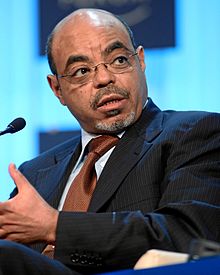Ethiopian opposition leader Negasso Gidada in Addis Ababa on October 6, 2010 (AFP/File, Aaron Maasho)
“The report has information on human rights violations on members of UDJ, on supporters and other political party members and leaders… in different parts of Ethiopia,” said Unity for Democratic Justice (UDJ) leader Negasso Gidada.
Negasso said seven party supporters had been killed in southern Ethiopia and around 150 supporters had faced intimidation, arrest without charge, abuse, abduction and confiscation of property by police and security forces across Ethiopia.
The Ethiopian government said it had not seen a copy of the report, but accused the party of routinely coming up with “concoctions and spurious accusations”, Information Minister Redwan Hussein told AFP.
UDJ is among a handful of opposition parties in Ethiopia, where only one out of 547 seats in parliament is occupied by an an opposition member.
Negasso, the former president of Ethiopia, said the report will be submitted to the Ethiopian Human Rights Commission and that he hopes the document will send a strong message to the government.
?We want the government to stop human rights violations and we are asking the government to bring those people concerned to justice,? he said, adding that his party had not lost any strength as a result of the violations documented in the report.
“The intimidation, the threats has not discouraged our members and we will continue our struggle,” Negasso said.
Last year, a leading member of the UDJ, Andualem Arage, was sentenced to life in prison on terror-related offenses.
UDJ has staged a series of demonstrations across Ethiopia this year, calling for the release of opposition members and journalists charged under Ethiopia’s anti-terrorism legislation.
Ethiopian Prime Minister Hailemariam Desalegn has issued stark messages to protesters in recent months, warning them that they will face harsh consequences if the break the law.
Rights groups have said the 2009 anti-terrorism law is vague and used to stifle peaceful dissent.

